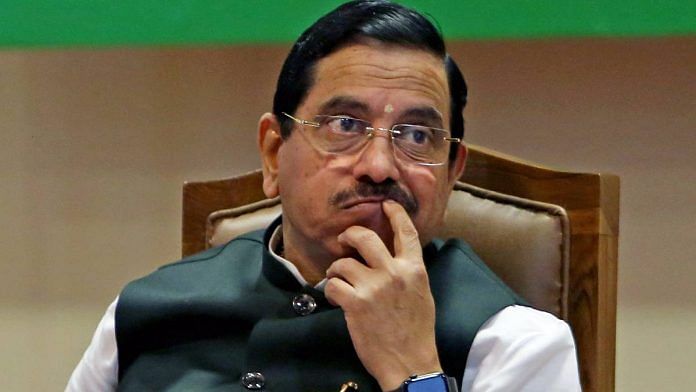New Delhi: Union mining minister Pralhad Joshi Wednesday launched India’s first-ever auction of 20 blocks of critical minerals, including lithium, molybdenum, and rare earth elements.
The total worth of the minerals in the 20 blocks is estimated to be Rs 45,000 crore, Joshi said at the launch event in Delhi.
The blocks up for auction — which will be conducted online — contain critical minerals such as lithium, rare earth elements, molybdenum, glauconite, chromium, lithium, nickel, potash, and phosphorite, among others.
They are located across Bihar, Chhattisgarh, Gujarat, Jharkhand, Odisha, Tamil Nadu, Uttar Pradesh and Jammu & Kashmir.
“The notice for inviting bids has been launched today. The bids will be closed on 20 February,” a senior official of the mining ministry said.
Of the blocks that have been put up for auction, there are two lithium blocks — one in Jammu & Kashmir and the other in Chhattisgarh.
With the launch of the auction, the official added, the ministry of mines will now start applying for clearances — some 23 clearances are required from the central ministries and state governments — before successful bidders can start mining.
Of the 20 blocks, 16 are up for a composite licence — for undertaking prospecting operations followed by mining — and four for a mining lease alone.
Speaking at a press conference following the launch, Joshi said, “We have always focussed on major minerals and surficial minerals. For the first time, we identified critical and deep-seated minerals, and exploration is being done at various levels. So far, we have identified 100 blocks, out of which we have put 20 blocks for auction.”
Joshi said that the process is on to auction the remaining blocks.
Referring to critical minerals like lithium and cobalt, the minister said they have become very important for India’s energy security. “As on date, our import bill of lithium is Rs 24,000 crore,” he said.
Since 2014, when the Narendra Modi-led NDA government came to power, several policy initiatives have been taken in this sector, he added, citing the amendment to the Mines and Minerals (Development and Regulation) Act, 1957, this year.
A mines ministry official said bidding is likely to be carried out in a two-stage process and completed within a month.
Also Read: India releases list of 30 critical minerals crucial for ‘economic development, national security’
Why the move matters
From mobile phones to electric vehicles, solar panels, semiconductors and wind turbines, all modern technologies are dependent on critical minerals such as lithium, graphite, cobalt, thalium and rare earth elements. Such minerals are essential not only in high-tech electronics and telecommunications, but also in transport and defence.
Earlier, state governments used to auction mineral blocks. But amendments to the Mines and Minerals (Development and Regulation) Act, 1957, in August 2023 gave the Union government the power to auction critical minerals.
The amendments also paved the way for the private commercial mining of six critical minerals — lithium, beryllium, niobium, tantalum, titanium and zirconium — and deep-seated minerals like gold, silver, and copper. Earlier, only government agencies were allowed to explore and mine these minerals.
The 5.9-milllion-tonne lithium reserve discovered by the Geological Survey of India in the Reasi district of Jammu and Kashmir in February is also on the auction list.
Last month, the Centre approved royalty rates of 3 percent each for lithium and niobium and 1 percent for rare earth elements.
Among the other significant steps taken by the government in the critical mineral sector this year is the June release of a comprehensive list of 30 critical minerals necessary for economic development and national security.
The 30 critical minerals identified include antimony, beryllium, bismuth, cobalt, copper, gallium, germanium, graphite, hafnium, indium, lithium, molybdenum, niobium, nickel, phosphorous, potash, titanium, tungsten and rare earth elements.
This report has been updated for a clarification in the definition of a composite licence
(Edited by Sunanda Ranjan)
Also Read: For 1st critical minerals policy, India proposes pooling with friendly nations, global investments



